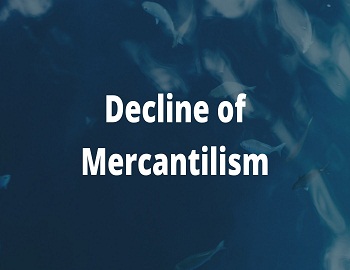Impact of Geographical Discoveries on Trade and Commerce:
Because of the discoveries of new countries and contact of the rest of the world with Europe, certain revolutionary changes were effected in trade and commerce. Born out of discoveries, research, and colonization of newly acquired lands, the changes in trade and commerce were so vast that they were designated as the “Commercial Revolution“. These changes set forth a model for European business in the 16th century and afterward. Some of the most important changes were an increase in inter-regional trade and commerce, an end of native preferences, the development of overseas trade, a massive and growing effect on the market, and the rise of new commercial organizations. In addition to it, the development of the money economy intensified commercial transactions. Various types of payments were disbursed extensively through currency. The facility of credit exchange was introduced. Drafts, letters of credit, and bills of exchange were widely used. Credit trading increased. But the system of value assessment was not rational. Certain changes were introduced in the process of distribution. Weekly markets were organized and business fairs decreased by and by.
Many European cities became centers of commercial activities where business flourished continuously. Paris, Amsterdam, London, Antwerp, etc. became the centers of business. It is interesting to know that at the outset of the 16th century, Antwerp had become a center of world trade. At this prominent port of the Netherlands, 200 to 250 cargo ships were unloaded daily. Antwerp was widely used for distributing goods brought from colonies of Europe. Many rich businessmen and traders had opened their trading offices in Antwerp. In about 1550, Antwerp was replaced by Amsterdam and London.
Prior to the discoveries of new countries, the European trade was mainly confined to the Mediterranean and the Baltic Seas, but now it extended to the regions of the Atlantic, Pacific, and Indian Oceans. The Mediterranean region did not remain self-dependent. The inhabitants of this region depended on outside supplies for subsistence. The Dutch and the English were most active in exchanging goods in the Atlantic region and other business centers of Europe. Italy had lost its monopoly over European business. The condition of businessmen living in Venice and Genoa became pitiable. The importance of Spain and Portugal, and after that of England and France, increased by and by but the impact of Spain and Portugal diminished because they were so much engrossed in dealing with the problems of their vast overseas empires that they lost control over their markets. It benefited Holland.




![Montagu Declaration or August Declaration [1917] 5 August Declaration-1917](https://gkscientist.com/wp-content/uploads/2020/10/August-Declaration-1917-350x200.jpg)




Comments (No)